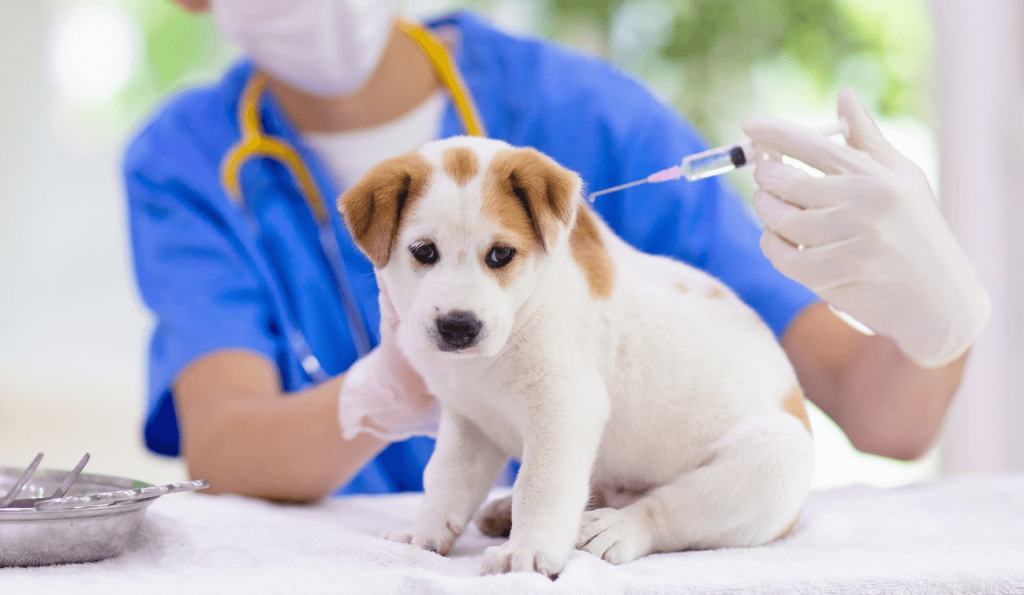
Vaccinating your pets is an important part of responsible pet ownership. Just like humans, animals can get sick and suffer from various diseases that can be prevented or minimized by vaccination. Vaccines stimulate an animal’s immune system to fight off infections and prevent them from becoming sick. By keeping your pets up-to-date with their vaccinations, you are not only protecting them but also other animals and humans they may come in contact with.
The frequency of pet vaccinations can vary depending on the type of animal, their age, and lifestyle. Some vaccines require annual boosters, while others may only need to be administered every few years. Additionally, some vaccines are considered core vaccines, meaning they are recommended for all animals, while others are optional and may depend on where you live and what activities your pet participates in. Your veterinarian can advise you on the appropriate vaccination schedule for your pet based on their individual needs. Overall, regular vaccinations can help keep your pet healthy and prevent the spread of diseases.
Why Pet’s Vaccination Important?
Pet vaccination is important for several reasons. First and foremost, vaccines help prevent the spread of infectious diseases that can be life-threatening for pets. Many of these diseases, such as rabies, distemper, parvovirus, and feline leukemia, are highly contagious and can easily spread from one animal to another. Vaccination can help protect your pet from contracting these diseases and also prevent them from transmitting them to other animals.
Vaccines can also help prevent the development of certain types of cancer in pets. For example, the feline leukemia vaccine has been shown to reduce the risk of cats developing leukemia, while the canine papillomavirus vaccine can help prevent certain types of cancer in dogs.
In addition to protecting pets, vaccines can also benefit humans by reducing the risk of zoonotic diseases, which are infections that can be transmitted from animals to humans. For example, the rabies vaccine not only protects pets from the disease but also helps prevent the spread of the virus to humans.
Overall, pet vaccination is a crucial part of responsible pet ownership that helps protect pets, humans, and other animals from infectious diseases.
How Do Vaccines Work?
Vaccines work by stimulating the body’s immune system to recognize and fight off a specific disease-causing pathogen, such as a virus or bacteria. Vaccines contain small amounts of weakened or inactive forms of the pathogen or pieces of its proteins or genetic material. When the vaccine is injected into the body, the immune system recognizes the foreign material as an invader and produces an immune response, including the production of antibodies.
The antibodies generated by the immune response remain in the body and can recognize and neutralize the pathogen if it enters the body in the future. This provides immunity against the disease without causing the person or animal to become sick from the full-blown infection.
In some cases, booster shots may be required to maintain immunity, as the immune response can wane over time. This is why some vaccines require multiple doses or regular boosters to ensure continued protection.
Overall, vaccines are an effective way to protect against infectious diseases and have been credited with significantly reducing the incidence of many diseases in both humans and animals.
Difference Between Core and Non Core Vaccination
Core Vaccination
Core vaccinations are those that are recommended for all pets, regardless of their lifestyle or environment. These vaccines protect against diseases that are widespread, highly contagious, and have serious health consequences. Examples of core vaccines for dogs include the vaccines for distemper, parvovirus, adenovirus, and rabies. Core vaccines for cats include the vaccines for feline herpesvirus, calicivirus, panleukopenia, and rabies.
Non Core Vaccination
Non-core vaccinations, also known as optional vaccinations, are those that are recommended based on an individual pet’s lifestyle and environment. Non-core vaccines are typically recommended for pets that are at higher risk of exposure to certain diseases due to factors such as geographic location, travel, or activities. Examples of non-core vaccines for dogs include vaccines for Lyme disease, leptospirosis, and canine influenza. Non-core vaccines for cats include vaccines for feline leukemia virus and feline immunodeficiency virus.
The decision to vaccinate a pet with non-core vaccines should be made in consultation with a veterinarian, who can assess the pet’s individual risk factors and recommend appropriate vaccinations based on their lifestyle and environment.
Benefits of Pet’s Vaccination
Pet vaccination has several benefits, including:
- Prevention of disease: Vaccinations help protect pets from diseases that can be serious, even fatal. For example, the rabies vaccine is required by law in many places because rabies is a fatal disease that can be transmitted to humans.
- Protection for humans: Some animal diseases can be transmitted to humans, and pet vaccination helps prevent the spread of these diseases. For example, leptospirosis is a bacterial disease that can be spread from dogs to humans, and the leptospirosis vaccine can help protect both pets and their owners.
- Saves money: Vaccinations can help prevent expensive medical bills by protecting pets from serious illnesses that require extensive medical treatment. In the long run, investing in preventative measures such as vaccinations can be more cost-effective than paying for treatment of a serious illness.
- Promotes community health: Vaccinations can help prevent the spread of diseases within animal populations, which is important for community health. This is particularly important for animals that come into contact with other pets at places like dog parks, boarding facilities, and grooming salons.
- Required by law: In some areas, certain vaccinations are required by law. For example, in many states, the rabies vaccine is required by law for dogs and cats.
Overall, pet vaccination is an important part of responsible pet ownership and can help keep pets and their owners healthy and protected.
What Vaccination Your Pet Need?
The top vaccinations recommended for pets vary depending on the type of animal, their age, lifestyle, and geographic location. However, the following are some of the most commonly recommended vaccinations for pets:
- Dogs:
- Distemper
- Parvovirus
- Adenovirus (hepatitis)
- Rabies
- Bordetella (kennel cough)
- Leptospirosis
- Lyme disease
- Canine influenza
- Cats:
- Feline herpesvirus
- Feline calicivirus
- Feline panleukopenia
- Rabies
- Feline leukemia virus
- Feline immunodeficiency virus
It’s important to note that these vaccinations may not be appropriate for all pets, and recommendations may vary based on factors such as the pet’s age, health status, lifestyle, and geographic location. Consultation with a veterinarian is essential to determine the appropriate vaccination schedule and to ensure that your pet receives the necessary vaccinations to protect their health.
When To Vaccinate Your Pet?
The timing of pet vaccinations depends on the type of vaccine and the age of the animal. In general, puppies and kittens receive a series of vaccinations starting at 6-8 weeks of age, with additional vaccinations given every 3-4 weeks until they are around 16 weeks old. Adult pets may receive booster vaccinations at regular intervals to maintain immunity.
The timing of vaccinations may also depend on the pet’s lifestyle and geographic location. For example, if the pet lives in an area where certain diseases are prevalent, or if they will be traveling to an area where certain diseases are common, they may need to receive additional vaccinations.
It’s important to consult with a veterinarian to determine the appropriate timing for vaccinations for your pet. The veterinarian can recommend a vaccination schedule based on the pet’s age, health status, lifestyle, and geographic location, and can ensure that your pet receives the necessary vaccinations to protect their health.
Do vaccinations have side effects?
Like any medical intervention, vaccinations can have side effects, although they are generally mild and short-lived. The most common side effects of vaccinations include:
- Mild fever
- Lethargy or tiredness
- Loss of appetite
- Localized swelling or tenderness at the injection site
- Allergic reactions, although these are rare
Most side effects are mild and go away on their own within a day or two. In rare cases, more serious side effects can occur, such as allergic reactions or anaphylaxis, but these are extremely rare.
It’s important to note that the benefits of vaccination far outweigh the risks of side effects. Vaccinations have been shown to be safe and effective in preventing many serious and potentially life-threatening diseases in pets. If you have any concerns about your pet’s health after receiving a vaccination, it’s important to contact your veterinarian right away.
Conclusion
Vaccinating your pet is an important part of responsible pet ownership, as it helps protect your pet from serious and potentially life-threatening diseases. Vaccines work by stimulating the immune system to produce antibodies against specific diseases, which helps to prevent infection or reduce the severity of the disease.
Core vaccinations are recommended for all pets, regardless of their lifestyle or environment, while non-core vaccinations are recommended based on individual risk factors. The frequency of vaccinations depends on several factors, including the type of vaccine, the pet’s age, lifestyle, and health status, as well as the geographic location.
While vaccinations can have mild side effects, such as fever and loss of appetite, these are generally short-lived and mild. The benefits of vaccination far outweigh the risks of side effects, and vaccines have been shown to be safe and effective in protecting pets from serious and potentially life-threatening diseases.
It’s important to consult with a veterinarian to determine the appropriate vaccination schedule for your pet and to ensure that your pet receives the necessary vaccinations to protect their health.
